Contents
Konrad’s umbrella is the name of a fungus of the Champignon family. Latin sounds like Macrolepiota konradii. The species forms mycorrhiza with plant roots. Spores germinate by absorbing nutrients and organic compounds from tree structures, and the fungus performs the function of breaking down soil humus into amino acids. Such cohabitation is mutually beneficial, so the plants get along well.
Where does Conrad’s umbrella grow?
The area of distribution of the species is very extensive. It can be found on the territory of the middle zone, Transcaucasia. The fungus grows in various types of forests, found in open clearings or forest edges. Prefers soil rich in humus and leaf litter. May be seen in city parks. Despite the large distribution area, it is considered a rare species.
Fruiting begins from the end of summer (in some areas – from the beginning of autumn) and lasts until October-November. It all depends on the ambient temperature. Therefore, individual groups of mushroom pickers are already in June. Grows singly and in small clusters. Pictured is Konrad’s umbrella:
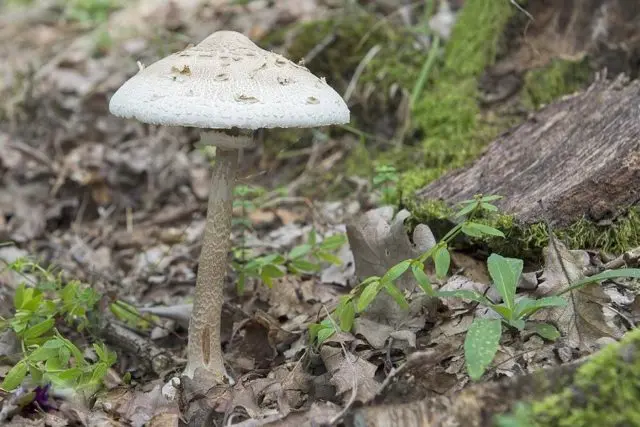
Despite its small size, Konrad’s umbrella mushroom is very much appreciated among fans of mushroom dishes.
What does Conrad’s umbrella look like?
Only adult mushrooms are suitable for collection due to the too small size of young caps. A developed fruiting body has the following features:
The cap reaches a diameter of 5 cm to 12 cm. In a young umbrella, it is ovoid, then it acquires a semicircular shape, in an adult mushroom it becomes prostrate. A characteristic feature is a tubercle in the center. The skin is thin brownish in color, cracking as the cap grows. A kind of “star-shaped” pattern is formed on the surface. The pulp is concentrated in the center of the cap, almost absent at the ends. White in color, does not change tone when broken.
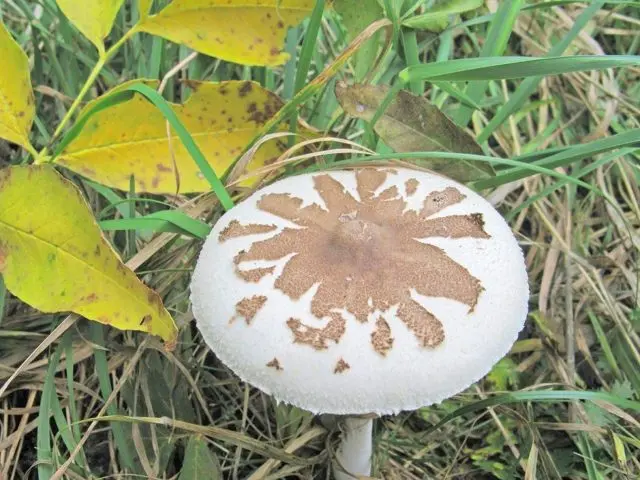
The original appearance of the cap surface is a distinctive characteristic of Konrad
Leg. High, the length reaches 10 cm. If the weather conditions are favorable, it grows up to 15 cm. The diameter does not exceed 1,5 cm. The leg slightly thickens downwards, there is a club-shaped formation at the base. In young specimens it is whole, in adults it is hollow. The skin on the leg is light brown, smooth, cracking over time. There is a ring on the leg. Light above, brown below.

To make sure the edibility of the found mushroom, you should sacrifice one and cut the hat
Plates. The Konrad species belongs to the lamellar species. The plates are frequent, wide white. Easily separated from the hat.
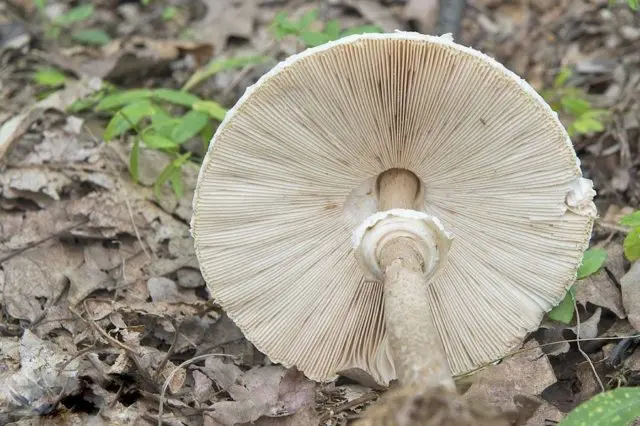
Be sure to pay attention to the color of the plates in order to distinguish edible specimens.
Spores are whitish-cream.
Taste and smell of fruit bodies are pleasant.
Can you eat Conrad’s umbrella
The mushroom has excellent taste characteristics. It is considered edible, after cooking it resembles the taste of champignons.
False doubles
Conrad’s umbrella has edible and false similar species. To enjoy this particular mushroom, you need to familiarize yourself with the distinctive features of other species:
Motley. Grows larger. It has a fibrous hat with a beige color and brown scales. The leg is hollow, fibrous, with a ring. The pulp is white, friable, belongs to edible mushrooms. The fruiting season overlaps, but Pied is more common on sandy soil.
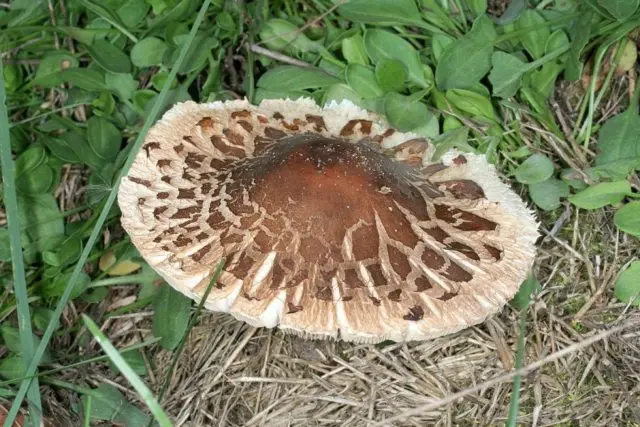
The hat of the species is very similar, but in Pied it is much larger in size.
White. Also an edible species with a fleshy cap that changes shape as the fungus grows. The leg is hollow curved, when touched it becomes orange. The fruiting period is the same as Conrad’s umbrella.
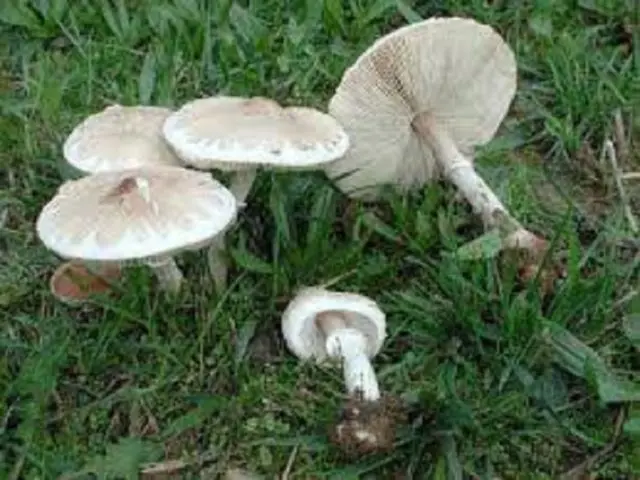
This mushroom is easy to distinguish by the color of the stem, if you touch it.
Poison Twins:
Fly agaric white has a skirt on the leg, which moves down. Conrad’s is static. There is also a Volvo on the leg, which is absent from the edible umbrella.
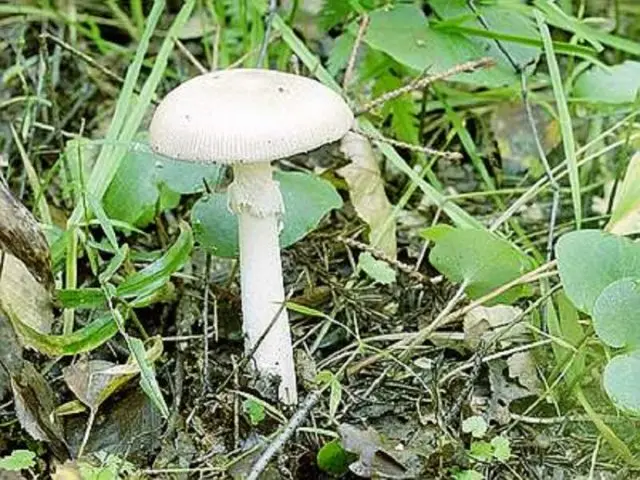
It is important to check all the characteristic signs of a poisonous mushroom so that the fly agaric does not get into the basket
The toadstool is pale. In the young stage, it can be mistaken for a Conrad umbrella due to the similarity of the hats. Therefore, experienced mushroom pickers are not advised to collect young umbrellas. First, it will protect against poisoning. Secondly, at this stage the cap is almost without pulp.
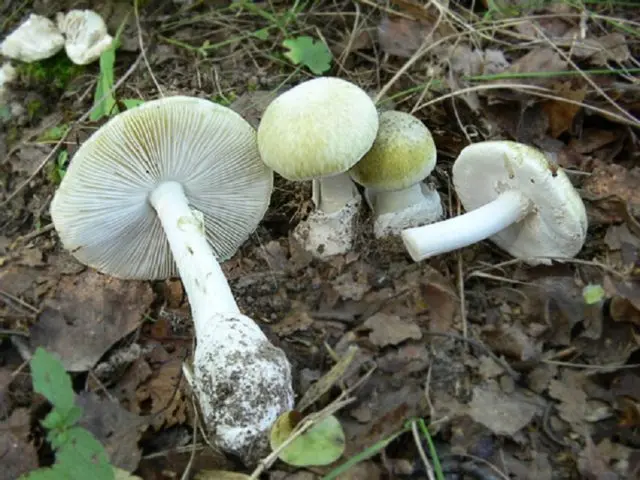
Toadstool is a very poisonous mushroom, the signs of which should be known for sure.
Rules for collection and use
Basic rules for mushroom pickers:
- Do not take fruiting bodies in which there is doubt.
- Bypass places near landfills, garbage heaps, industrial areas, railway tracks.
- Collect Konrad’s umbrellas only in adulthood, leave young ones.
- Process the mushrooms as quickly as possible.
- Eat caps for food, removing the legs after boiling.
Conrad’s umbrellas are classified as dietary mushrooms. The taste of their dishes is very pleasant. The nutritional composition is quite diverse, fruiting bodies contain a large list of useful substances for the human body. If you need to cook mushroom soup, then the legs cannot be thrown away, they give a rich broth. They are removed after boiling. The main dishes are prepared from hats, which are rich in protein. It is not recommended to use umbrellas for people with diseases of the pancreas, intestines, liver. You should also refrain from dishes with umbrellas for nursing mothers and children under 5 years old.
Fruit bodies are suitable for any type of processing – boiling, frying, pickling, pickling, drying.

If one umbrella is found, you need to look for its brothers nearby
Conclusion
Konrad’s umbrella is a very nutritious and tasty mushroom. Having studied the main characteristics of the species, you can collect a whole basket of nutritious umbrellas and cook a lot of dietary dishes.









